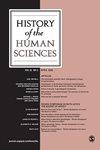The visualization of autism: Filming children at the Maudsley Hospital, London, 1957–8
IF 0.5
2区 历史学
Q2 HISTORY & PHILOSOPHY OF SCIENCE
引用次数: 0
Abstract
This article examines three films made during the 1950s by Elwyn James Anthony at the psychotic clinic for children at the Maudsley Hospital that marked an important transition in the purpose and practice of visual documentation in a clinical setting: film as a research tool was transitioning from the recording of external signs as indicators of internal subjective states, to the capture of the visual flow of communication between subjects. It is a shift that had a particular impact on the emergent classification of autism, a modality not yet properly separated from the broader term of psychosis, as a non-relational condition whose visual capture demonstrated a void of inter-human communicational exchange. Film was significant not only as a recording apparatus, but as a method of cutting and crafting sequences of movements into brief repetitive motifs. The filmed behaviour of children remained opaque to interpretation, a ‘finding’ that facilitated the modelling of an emergent autism as subjects who were isolated, alienated and automaton-like, inhabiting a separate temporality. The article situates this ‘second’, affectless autism, within a broader context of post-war research into gestures as a language of the body, developed largely through an intellectual network of German émigré psychoanalysts who had fled to the US and UK in the 1930s.自闭症的可视化:拍摄伦敦莫兹利医院的儿童,1957-2008 年
本文研究了埃尔温-詹姆斯-安东尼(Elwyn James Anthony)于 20 世纪 50 年代在莫兹利医院(Maudsley Hospital)儿童精神病诊所拍摄的三部电影,这三部电影标志着临床环境中视觉记录的目的和实践的重要转变:电影作为一种研究工具,正在从记录作为内部主观状态指标的外部迹象,转变为捕捉受试者之间交流的视觉流。这一转变对自闭症的新分类产生了特别的影响,自闭症是一种尚未从更广泛的精神病术语中适当分离出来的模式,是一种非关系性疾病,其视觉捕捉显示了人与人之间沟通交流的缺失。电影的重要意义不仅在于它是一种记录工具,还在于它是一种将动作序列剪辑成简短重复主题的方法。被拍摄的儿童行为仍然无法解释,这一 "发现 "有助于将新出现的自闭症儿童塑造成孤立、疏离和自动的主体,他们居住在一个独立的时空中。文章将这种 "第二种"、无情感的自闭症置于战后研究手势作为身体语言的大背景下,这种研究主要是通过 20 世纪 30 年代逃往美国和英国的德国移民精神分析学家的知识网络发展起来的。
本文章由计算机程序翻译,如有差异,请以英文原文为准。
求助全文
约1分钟内获得全文
求助全文
来源期刊

History of the Human Sciences
综合性期刊-科学史与科学哲学
CiteScore
1.60
自引率
11.10%
发文量
31
审稿时长
>12 weeks
期刊介绍:
History of the Human Sciences aims to expand our understanding of the human world through a broad interdisciplinary approach. The journal will bring you critical articles from sociology, psychology, anthropology and politics, and link their interests with those of philosophy, literary criticism, art history, linguistics, psychoanalysis, aesthetics and law.
 求助内容:
求助内容: 应助结果提醒方式:
应助结果提醒方式:


